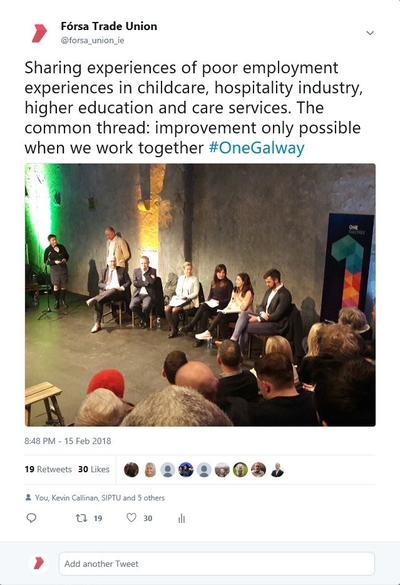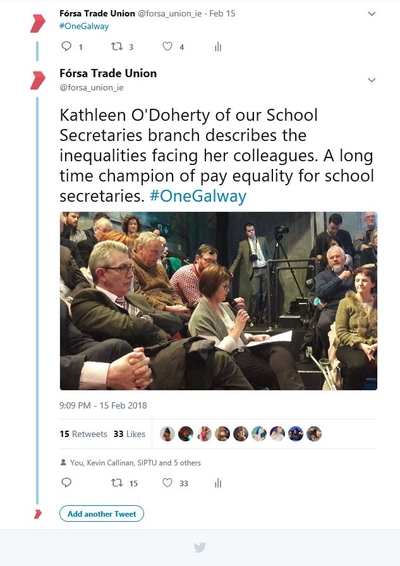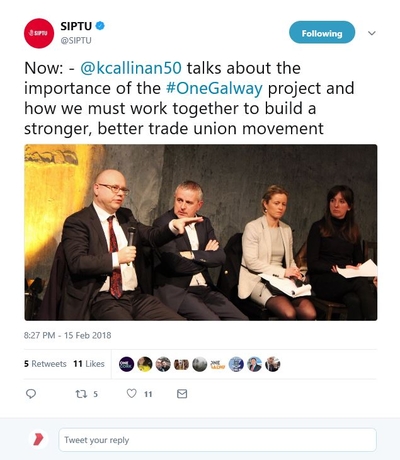Stage notes on addiction
Fórsa member Lisa Walsh readies for tour of new play
by Niall Shanahan
Love In The Wild is a new play written by Lisa Walsh, and opens next month at the Axis theatre in Ballymun. Lisa is a member of Fórsa and a social worker in child protection services. We met last week to talk about her inspiration for the play, its development from page to stage, and her desire to challenge the stigma of addiction.
Love In The Wild is a new play written by Lisa Walsh, and opens next month at the Axis theatre in Ballymun. Lisa is a member of Fórsa and qualified as a social worker as a mature student in 1999. She is currently working in child protection having previously worked as a medical social worker and an addiction worker.
We met last week to talk about her inspiration for the play, its development from page to stage, and her desire to challenge the stigma of addiction.
“The play is a one-man show about a man called Ger Duffy. He’s from Ballymun on Dublin’s north side. He’s on a methadone programme and he’s journeying through addiction and through big changes in his life.
“He has a strong connection to wildlife and nature, which helps explain how he sees the world, a way that’s quite different to how most people see it.
“The play is about love, it’s about judgment but hopefully it’s also about redemption. He’s not the stereotype of an addict, there are many layers to Ger and many layers to his story,” Lisa explained.
Inspiration
Ger’s experience was informed and inspired by Lisa’s work in addiction services over the last 20 years. While taking part in a creative writing course five years ago, Lisa recalled a story she’d heard about one addict’s experience of visiting Ballymun swimming pool 20 years previously.
“The swimming pool was a huge feature of life for anyone who grew up in Ballymun. Swimming and Chester slices - the cakes we had after we went swimming – were a big part of the Ballymun childhood.
“He went back as an adult for a swim but he left because he became very self-conscious of being - as he called himself - a ‘junkie’. It stayed with me and came back to me when I started writing,” she said.
The play has toured in a number of addiction centres in Dublin. Lisa said the response to those performances helped to inform the development of the play. “One man told me ‘We’ve all had that walk of shame, where we were walked out of places, security man would come over and put his hand on your shoulder.’ When he described that I knew we were on to something, because it’s trying to give a voice to that experience.”
Lisa said it made her think about Ballymun and the experience of stigma. “I grew up with a lot of stigma myself, my mam had addiction problems. When I started to write lots of things came back to me, like my experience of being a little girl with my mam, and the way people treated her, and later looking at the experience of people when I worked in addiction services. It’s why I was drawn to social work in the first place.”
Love in the Wild is performed by Anto Seery, directed by Peter Sheridan and produced by Sheila & Peter Sheridan.
The play opens in the Axis theatre in Ballymun on Thursday 8th March (International Women's Day) and will tour throughout March in a number of Dublin venues.
Watch the trailer here.
More information on dates, venues and booking here.

Love in the Wild is performed by Anto Seery
 |
|
Parental leave barrier removed
by Billy Hannigan
Fórsa has removed an anomaly in the way pensionable service is calculated for civil servants who take parental leave on a Friday and the following Monday.
Fórsa has removed an anomaly in the way pensionable service is calculated for civil servants who take parental leave on a Friday and the following Monday. The move means such civil servants will now lose only two days pensionable service, rather than four.
Personnel officers have been issued with details of the new method of calculating pensionable service for staff in these circumstances.
While the letter says the change comes into effect on 9th February 2018, the union understands that it will be applied retrospectively once the associated administrative issues are resolved.
Survey results: Will a robot take your job?
In the last edition of the news bulletin we asked Fórsa members if they had concerns that a robot might eventually take over their job.
In the last edition of the news bulletin we asked Fórsa members if they had concerns that a robot might eventually take over their job.
Of those who took the survey, 51% of respondents said they weren't worried about their own job, but they were concerned for others, while 41% confidently stated that a robot could not do their job.
A few people have genuine concerns, with just 8% stating that their job is likely to be automated in the future.
The automation of work and the development of Artificial Intelligence (AI) technology is an issue of growing interest for Fórsa. Both developments present huge challenges for workers and unions, and we will bring you more on this in the coming months as part of the Fórsa Insights podcast series.
‘Room to improve’ on gender pay reporting - Eurofound
by Niall Shanahan
Report says evaluations in the four sample EU states point to a ‘bumpy ride’ in terms of gender pay gap reporting compliance.
As the focus on the gender pay gap continues, the European Foundation (Eurofound) has produced a report reviewing the experiences in four member states – Austria, Denmark, Sweden and Finland – based on their company-level gender pay reports and audits.
The report follows the European Commission’s announcement last November that further targeted measures to improve gender pay transparency may be needed at EU level.
Eurofound’s report says evaluations in the four sample states point to a ‘bumpy ride’ in terms of compliance, at least in the initial phase of rolling out the instruments in some countries. It says there’s “room for improvement in engaging employee representatives and in raising employees’ awareness.”
It says the success of any measures depend on “the extent to which the existence of unjustified gender pay gaps is acknowledged” by the various actors involved, and their willingness to engage in a meaningful dialogue and follow-up.
The Gender Pay Gap Information Bill 2017 was accepted by the Irish Government last October. The Bill, which was backed by a strong Fórsa campaign, assigns new powers to make mandatory information disclosure schemes, compelling businesses to publish details on what they pay men and women.
After extensive lobbying on the issue last year, Fórsa continues to actively engage with stakeholders within and beyond Leinster House. Discussions between Congress and the employer group Ibec are at an advanced stage. It is now expected that an agreed employer-union position will emerge from these talks.
Fórsa continues to engage with other unions and advocacy groups on the issue.
The Eurofound report is available here.
Fórsa FAQs
your questions answered
|
Inoperable PeoplePoint a ‘systemic failure’
20th February 2018
Fórsa and other civil service unions have demanded a meeting with the Civil Service Management Board, which is made up of departmental secretaries-general, to seek an urgent resolution of problems with the PeoplePoint system.
Fórsa and other civil service unions have demanded a meeting with the Civil Service Management Board, which is made up of departmental secretaries-general, to seek an urgent resolution of problems with the PeoplePoint system.
The union says salary underpayments and overpayments caused by the HR package are hurting public servants, while delays in processing leave, flexi time, sick leave, and pensions are endemic.
Fórsa general secretary Tom Geraghty said the union had asked branches to raise problems associated with PeoplePoint at departmental councils. Members are also being encouraged to use the PeoplePoint complaints procedure, which enables them to raise issues with management directly.
The issue of overpayments hit the headlines last week when the Oireachtas Public Accounts Committee quizzed representatives of the National Shared Services Office, which runs PeoplePoint. But Geraghty expressed concern that equally problematic underpayments had not been discussed.
“The problem of overpayments has reached epidemic proportions under PeoplePoint. It has caused great suffering to many civil servants, often in vulnerable financial circumstances, who have to repay money they do not have. The extensive underpayments and unprecedented delays in paying people their correct salary once they are appointed or promoted is equally problematic. It’s difficult to identify a single aspect of PeoplePoint activity that has not given rise to problems,” he said.
Tom said staff trying to operate the “inoperable” system were unfairly under excessive pressure.
Fórsa attends monthly meetings with PeoplePoint officials to go through cases where problems have occurred. But Tom says few civil servants use the complaints procedures. “This means management can dismiss complaints of systemic failure as anecdotal, rather than fact-based,” he said.
To help counter this, the union is to conduct a survey on members’ experience of the system.
Revenue promotion discussions continue
by Derek Mullen
Discussions over promotion sequences at executive officer level in Revenue will continue later this month. Fórsa has told management that too many open appointments are being made in some regions, including the border, the midlands, and the west.
Discussions over promotion sequences at executive officer level in Revenue will continue later this month. Fórsa has told management that too many open appointments are being made in some regions, including the border, the midlands, and the west.
The union says it will consider seeking a third party referral if managers continue to make high numbers of open appointments when staff are awaiting promotion from internal panels.
There is also concern over the number of direct clerical officer appointments in Nenagh. The posts have arisen on foot of the PAYE modernisation project. Fórsa says half of these posts should be filled by transfer in accordance with the agreement. But management argues that they are catching up with direct recruitment following years of filling posts mostly through transfer.
The union’s Revenue national committee will consider referring the matter to adjudication at its next meeting, which takes place in early March.
The committee is also to review staffing and grading issues across the regions, with particular reference to 1890 call staff in PAYE. Fórsa members have raised concerns about staffing levels, work pressures, and call monitoring.
Separately, the union has set out a detailed position to management on the introduction of GPS vehicle monitoring systems in enforcement vehicles. Fórsa has told management it will halt cooperation with vehicle monitoring if it is used inappropriately. The union also intends to seek the reintroduction of the driving allowance.
On a separate enforcement matter, Fórsa has this week cleared a circular which will open enforcement posts in Dublin Port to interdepartmental competition on a once-off basis. The union agreed to this on foot of difficulties with filling posts in Revenue.
Garda equal pay case with Court
by Eoin Ronayne
The long-running Garda equal pay case concerning clerical officers is likely to return to a resumed hearing at the Labour Court this spring.
The long-running Garda equal pay case concerning clerical officers is likely to return to a resumed hearing at the Labour Court this spring. The case has been before the Court following a High Court judgement, which came after legal questions were referred to the European Court of Justice.
On foot of a High Court ruling, the Labour Court has been examining comparators from among other Garda officers doing clerical work. These comparators were drawn at random by the Court.
Fórsa is currently responding to a series of queries from the Court. These are related to its comparison exercise.
Work on the comparators is expected to be completed in the coming weeks, and a resumed Labour Court hearing will then take place.
Fórsa meets Pay Commission
by Bernard Harbor
The Public Service Pay Commission (PSPC) says it has received a large number of submissions from unions on the issue of civil and public service recruitment and retention issues. These include submissions from Fórsa on problems in the civil service and among health and social care professionals.
The Public Service Pay Commission (PSPC) says it has received a large number of submissions from unions on the issue of civil and public service recruitment and retention issues. These include submissions from Fórsa on problems in the civil service and among health and social care professionals.
At a recent meeting with unions and officials from the Department of Public Expenditure and Reform (DPER), the PSPC said it had now sought submissions from public service employers. It has also commissioned independent research.
The Commission says it is not contemplating oral presentations at this stage, but it may seek clarification of aspects of the submissions it has received.
Last November, the PSPC issued a written statement setting out its approach to the work. It aims to report on issues relating to nursing, consultants and junior doctors by the end of June 2018, and to report on other staff groups outlined in its initial report by the end of this year.
In a related development, the finance minister ruled out the introduction of Dublin allowances when he spoke to the Oireachtas finance committee last week. Paschal Donohoe told the committee that staff retention was a bigger problem than recruitment, particularly in the capital.
Read the PSPC statement of approach here.
Childcare price disparities grow
by Diarmaid Mac A Bhaird
The cost of childcare in Dublin is significantly higher than in other parts of the country, according to a new report by the union-backed Nevin Economic Research Institute (NERI).
The cost of childcare in Dublin is significantly higher than in other parts of the country, according to a new report. The study of the affordability of childcare in Ireland finds that full-time childcare for one child in Fingal costs 40% of a medium-earning worker’s net income.
Published by the union-backed Nevin Economic Research Institute (NERI), the study also found that full-time childcare for two children anywhere in Dublin costs more than the net income of a minimum wage earner.
The report examined part-time and full-time childcare costs for one-parent families with one child, and households with two children and two earners. Leitrim had the lowest average full-time childcare costs, while Dun Laoighaire-Rathdown is the most expensive.
Rural counties generally had much lower childcare costs, but the report warned that a national 4.3% rise in the price of childcare “masks” regional disparities.
The study also discusses the wider economic repercussions of the high cost of childcare in Ireland. The authors speculate that it has a detrimental effect on employment because it limits participation in the workforce.
“Ireland has some of the highest costs for full-time childcare as a proportion of disposable income in the OECD and one of the lowest spends on early childhood education as a proportion of GDP,” it says. It also suggests that increased spending on early childhood education results in long-term economic gains.
Last December, an advisory note on pay bargaining by ICTU’s Private Sector Committee highlighted “excessive” childcare costs. IMPACT – one of the three unions that recently merged to create Fórsa – had earlier made a budget submission, which called for increased spending on early childhood education following years of underinvestment.
Trade unions and students launch One Galway
The project is a collaborative initiative comprising trade and student unions operating in the Galway area.
by Niall Shanahan
The ONE Galway initiative was launched last week (Thursday 15th February) with a packed house at the Mick Lally Theatre in Galway City.

The ONE Galway initiative was launched last week (Thursday 15th February) with a packed house at the Mick Lally Theatre in Galway City.
The project is a collaborative initiative comprising trade and student unions operating in the Galway area, supported by the Irish Congress of Trade Unions and the Galway Council of Trade Unions.
Fórsa deputy general secretary Kevin Callinan, who was one of the speakers at the event, explained: “The aim of the project is to foster a deeper engagement and collaboration between trade unions, student unions and community groups at workplace and societal levels to organise, campaign, educate and communicate with workers and the wider community.
“Building on the successful model established by the ONE Cork initiative, launched in 2016, ONE Galway is about organising workers, their families and communities to influence change and create a future within which there is access to decent work, decent pay and a decent standard of living for all,” he said.
Precarious work
The initial campaign focus for ONE Galway will be on precariousness and the exploitation of workers. The launch event featured a strong presentation on the issue from Dr Michelle O’Sullivan of the University of Limerick.
In her presentation, Dr O’Sullivan said “Precariousness, at its heart, is about uncertainty, and every problem, every poor outcome that workers have is because of uncertainty. Whether its hours, job or social insecurity, it’s about uncertainty.”
Dr O’Sullivan said many employers like to think of full-time, permanent jobs as something “of the past” and said she was “highly sceptical” when employers claimed that millennials were no longer interested in full-time, permanent jobs. She said it was important to challenge the claim that more secure working arrangements was a thing of the past.
Members of the audience joined the discussion to share their experiences of poor quality employment in childcare, the hospitality industry, higher education and in care services. Most of the contributions emphasised that improvement is only possible when people work together to secure them.
Campaigns
While similar to the Cork initiative, ONE Galway’s focus lies in a broader organisational engagement from the outset, where student unions are working alongside their trade union counterparts on campaigns such as housing needs, in addition to the campaign focus on precarious working.
Joe Cunningham, the general secretary designate of SIPTU, said: “ONE Galway will also work to better equip and increase the capacity of the trade union movement in Galway city and county to deal together with the many different challenges which face workers, particularly students, younger workers and those from our migrant communities.”
Kevin added: “It’s about consolidating the strength, resources and expertise locally of all these organisations and building a stronger network to improve living and working conditions and achieve significant gains for all workers through greater trade union and civic participation.”
  
Fórsa audio news bulletin
|
|
|